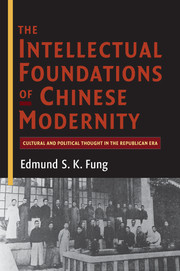 The Intellectual Foundations of Chinese Modernity
The Intellectual Foundations of Chinese Modernity Published online by Cambridge University Press: 03 May 2010
Cultural conservatism stood opposed to cultural radicalism, yet the two were in more of a dialectical than an antithetical relationship. To understand this relationship, it is necessary to begin with a clarification of the term ‘cultural conservatism’. Yü Ying-shih uses the term to denote an attitude or inclination towards maintaining the cultural status quo. In line with his view on the progressive ‘radicalization of China’ in the twentieth century, Yü sees an excess of radicalism culminating in the Cultural Revolution. He laments that conservatism was too weak as a restraint and counterforce, adding that throughout the century there were no true conservatives in China, only varying degrees of reformism and radicalism.
Yü's view has been challenged by the PRC writer Jiang Yihua, who, drawing on the work of the British conservative Hugh Cecil (1869–1956), argues that conservatism meant not opposition to change but ‘change within a defined scope and within a specific framework of value orientation that respects tradition, authority and nationalism’. Jiang finds conservatism in twentieth-century China too strong and too enduring and blames it for China's failure to resolve its myriad problems. On the other hand, radicalism was rather weak in terms of its capacity to establish new economic, political, social and cultural categories and structures for change. The Cultural Revolution was not the culmination of radicalism but the result of ‘an inherited poison of feudal despotic thought and politics’.
To save this book to your Kindle, first ensure no-reply@cambridge.org is added to your Approved Personal Document E-mail List under your Personal Document Settings on the Manage Your Content and Devices page of your Amazon account. Then enter the ‘name’ part of your Kindle email address below. Find out more about saving to your Kindle.
Note you can select to save to either the @free.kindle.com or @kindle.com variations. ‘@free.kindle.com’ emails are free but can only be saved to your device when it is connected to wi-fi. ‘@kindle.com’ emails can be delivered even when you are not connected to wi-fi, but note that service fees apply.
Find out more about the Kindle Personal Document Service.
To save content items to your account, please confirm that you agree to abide by our usage policies. If this is the first time you use this feature, you will be asked to authorise Cambridge Core to connect with your account. Find out more about saving content to Dropbox.
To save content items to your account, please confirm that you agree to abide by our usage policies. If this is the first time you use this feature, you will be asked to authorise Cambridge Core to connect with your account. Find out more about saving content to Google Drive.